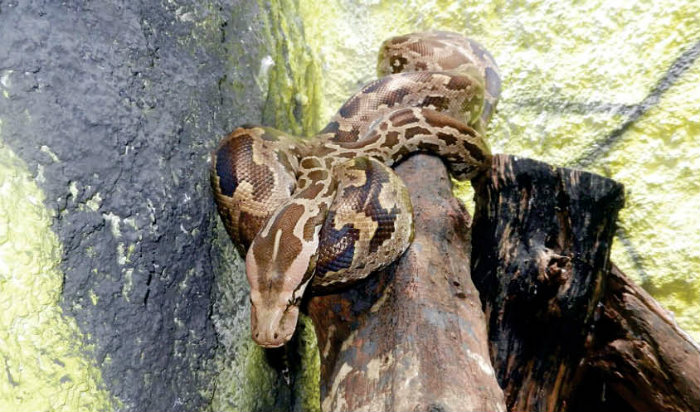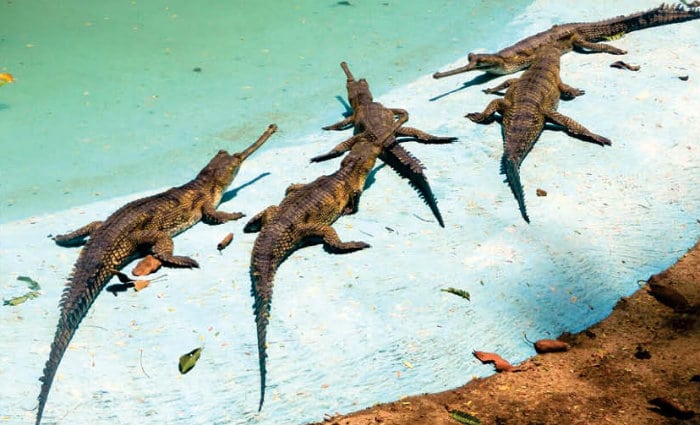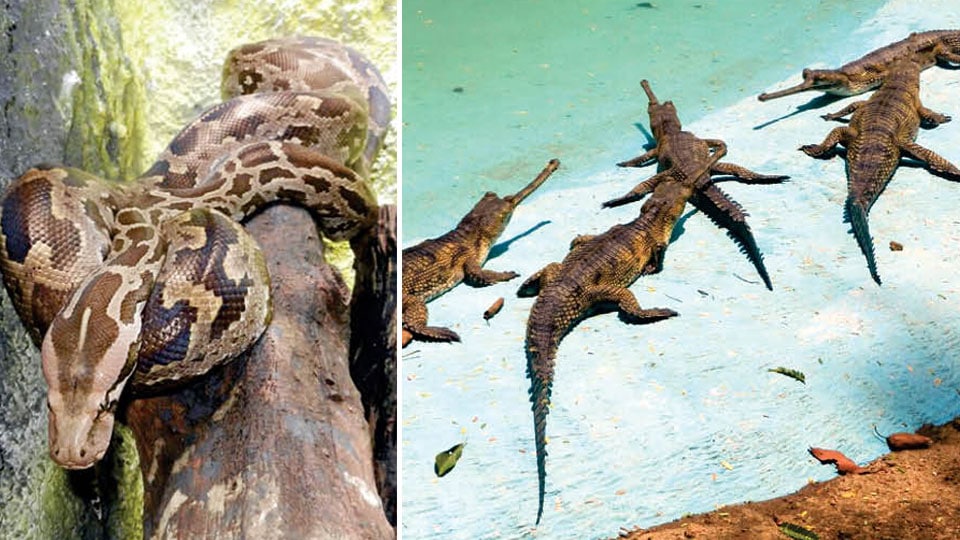Mysuru: Sri Chamarajendra Zoological Gardens, popularly known as the Mysuru Zoo and one of the oldest zoos of the country received two reptile species for breeding from Tamil Nadu on Sept. 6.
Four Rock Pythons (Two males and two females) and five Gharials (Two males and three females) were received from Madras Crocodile Bank Trust in Mamallapuram in Tamil Nadu as per the approval accorded by the Central Zoo Authority of India, New Delhi, under Animal Exchange Programme in the form gift for the purpose of conservation of breeding. The health conditions of the animals are stable, according to a press release from Zoo Executive Director C. Ravishankar.
Indian Rock Python: Indian Rock Python (Python Molurus) is a large non-venomous Python species found in many tropic and sub-tropic areas of the Indian Sub-continent and Southeast Asia. It is also known as Indian Python, Black-Tailed Python and Indian Rock Python.

One of the four Indian Rock Pythons
They are found in Andhra Pradesh, Bihar, Chattisgarh, Delhi, Goa, Gujarat, Haryana, Jammu & Kashmir, Jharkhand, Karnataka, Kerala, Madhya Pradesh, Maharashtra, Odisha, Puducherry, Punjab, Tamil Nadu, Telangana, Uttar Pradesh, Uttrakhand and West Bengal.
This reptile can be easily identified by checking its large size, dark irregular patches, pinkish head and slow locomotion.
On provocation, it coils itself and keeps head slightly above the ground; hiss almost the same like Russell’s Viper and bites repeatedly if one comes in its attacking range. On catching its prey, the Python tightly coils around the limbs and suffocate the prey before swallowing it whole.
Though Indian Rock Python is non-venomous, it gives injurious bite with numerous small but sharp teeth which can cause skin rupture on the site of bite.
Indian Rock Python is one of the most threatened species due to- Road kill mortality; killing due to conflict in agricultural fields and around water bodies due to its large size; due to misidentification and confusion with venomous species Russell’s Viper which share almost the same kind of habitat.
This reptile is killed for its beautiful and tough skin and its trade is high in various parts of country which is illegal. Habitat loss is one more reason because this species prefers wet surrounding or long time stable water bodies for its activities. Due to destruction of water bodies, habitat of Python remains no more natural and it has to migrate from the area. Like all Pythons, Indian Rock Python is always in demand by foreign and Indian keepers for pet trade.
Gharial (Gavialis Gangeticus): The gharial (Gavialis Gangeticus), also known as the Gavial, is a crocodilian of the Gavialidae family. This fish-eating crocodile is a native of the northern part of the Indian Sub-continent.
Gharial is one of the three species of crocodilians found only in the Indian sub-continent and is also known as Long-nosed Crocodile and is the longest living species of crocodilians in the world.

Five Gharials received by Mysuru Zoo from Madras Crocodile Bank Trust.
Gharial was found in India, Pakistan, Nepal, Bangladesh, Bhutan and Myanmar but is now are extinct in most of these countries. The remaining Gharial populations are restricted to India and Nepal.
Gharials used to grow up to 7 mts (23 ft), in the past history of India. Due to hunting for skins, medicine and habitat loss, Gharials now fall in the category of one of the most Critically Endangered Species of reptile in the world.
Today, small populations of Gharials are present in Son River, Girwa River, the Ganges, Mahanadi River and the Chambal River. National Chambal Sanctuary is the only place in India where a large wild population of Gharial is found.








Recent Comments